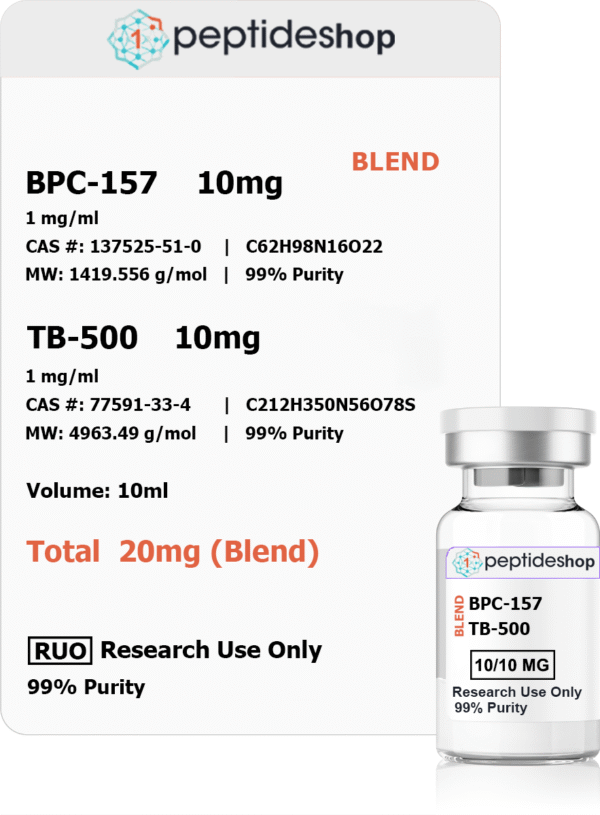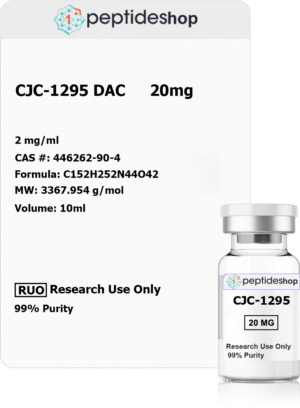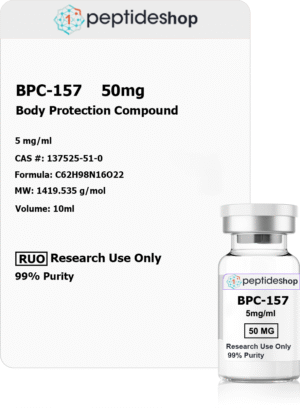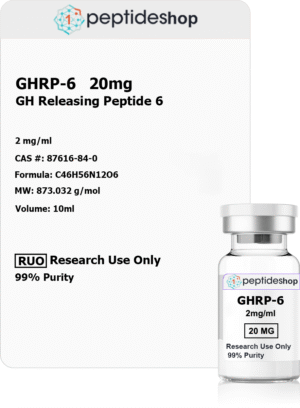BPC-157, TB-500 (20mg) (Blend)
Original price was: $110.00.$69.00Current price is: $69.00.
BPC-157 and TB-500 (Thymosin Beta-4) are peptides commonly studied for their potential in promoting tissue repair and healing. Both have distinct yet complementary mechanisms that, when combined, may offer synergistic benefits. BPC-157, a stable gastric pentadecapeptide, is derived from a protective protein found in the stomach lining. It has been shown in preclinical studies to accelerate healing of muscles, tendons, and ligaments by promoting angiogenesis (the formation of new blood vessels) and regulating the production of growth factors. Similarly, TB-500, a fragment of the naturally occurring Thymosin Beta-4 protein, plays a key role in cell migration, tissue regeneration, and reducing inflammation.
The potential synergy between these peptides arises from their overlapping yet distinct pathways in tissue repair. While BPC-157 excels at improving blood flow and reducing inflammation, TB-500 focuses on facilitating cellular migration to the injury site and supporting the repair process at the cellular level. Together, they may accelerate healing by addressing multiple aspects of tissue recovery, particularly in sports injuries or chronic conditions where regeneration is compromised. Early animal studies suggest this combination may lead to faster recovery times and improved structural integrity of repaired tissues.
It is crucial to note that while promising, much of the research on BPC-157 and TB-500 remains preclinical.
Contents of the Package
- 1 x sterile 10ml multi-dose vial
- Each ml contains:
- BPC-157: 1 mg
- Thymosin Beta-4 (TB-500): 1 mg
- Diluted in bacteriostatic saline
- Clear, sterile injectable fluid
- Packaged in tamper-proof USP-grade glass vial
- For subcutaneous administration only
About BPC-157, TB-500
This combination features two of the most clinically studied regenerative peptides: BPC-157 and TB-500 (Thymosin Beta-4). Together, they work synergistically to enhance soft tissue repair, inflammation control, angiogenesis, and wound healing.
- BPC-157 is a 15-amino-acid fragment derived from human gastric juice, known for its ability to support gut integrity, tendon healing, and cellular repair.
- TB-500 is a synthetic analog of thymosin beta-4, a naturally occurring peptide involved in actin regulation, angiogenesis, and wound repair.
This pairing is ideal for supporting recovery from:
- Soft tissue injuries (tendon, ligament, muscle)
- Joint inflammation and mobility issues
- GI barrier dysfunction
- Post-surgical healing
- Athletic injury management
Adverse Reactions
This combination is well tolerated with minimal side effects reported in clinical use and animal models.
Potential side effects may include:
- Mild redness or irritation at injection site
- Temporary dizziness or fatigue
- Rare: nausea, headache, or lightheadedness
No major systemic effects have been reported at therapeutic doses. Both peptides are non-hormonal, with low allergenic potential.
Mechanism of Action
🔬 BPC-157:
- Activates VEGF, TGF-β, and nitric oxide pathways to promote angiogenesis and tissue repair
- Supports fibroblast migration and collagen formation
- Protects gut mucosa, promotes vascular stability, and reduces inflammation
🔬 TB-500 (Thymosin Beta-4):
- Regulates actin dynamics, essential for cell migration and tissue regeneration
- Enhances capillary formation and wound re-epithelialization
- Modulates pro-inflammatory cytokines and accelerates soft tissue healing
Together, they create a pro-regenerative environment that supports both localized and systemic healing processes.
Benefits
Potential Benefits:
- Enhanced tendon, ligament, and muscle repair
- Accelerated post-surgical healing
- Reduction in joint inflammation and pain
- Support for gut barrier function (BPC-157)
- Increased vascular regeneration and tissue oxygenation
- Improved mobility, flexibility, and recovery time
Side Effects
⚠️ Possible Side Effects:
- Minor injection site discomfort
- Rare: headache, temporary fatigue, nausea
- No known impact on hormonal axis or long-term organ function
Contraindications & Precautions
- Not recommended in individuals with known allergy to peptides or excipients
- Avoid use in individuals with active cancer without physician supervision
- Use caution in those with bleeding disorders or on anticoagulants (due to angiogenic effects)
- Should not be injected intravascularly or intramuscularly
Drug Interactions
No known direct drug interactions have been reported for either BPC-157 or TB-500. Both may be combined safely with:
- NSAIDs or other anti-inflammatory agents
- PRP or stem cell therapy
- GH secretagogues (e.g., CJC-1295, Ipamorelin) for enhanced healing
- Supplements such as collagen, omega-3, or glucosamine for joint support
Pregnancy & Breastfeeding
There is insufficient safety data for the use of either BPC-157 or TB-500 in pregnancy or during breastfeeding. While preclinical studies show no teratogenicity, use is not recommended during pregnancy or lactation.
Children
These peptides have not been studied in pediatric populations, and use in individuals under 18 is not advised unless supervised by a pediatric specialist for clinically indicated regenerative therapy.
FDA approval
- Neither BPC-157 nor Thymosin Beta-4 (TB-500) is currently FDA-approved
- Both peptides are considered investigational compounds
- This compounded formulation is not approved for any therapeutic indication, but is widely used in clinical research, sports medicine, and functional recovery protocols
References
- Sikiric P, et al. (2018). “BPC-157 and tissue healing: from GI tract to musculoskeletal repair.” Journal of Orthopaedic Research.
- Brcic L, et al. (2020). “BPC-157 and angiogenesis modulation.” Biomedicine & Pharmacotherapy.
- Goldstein AL, et al. (2007). “Thymosin beta-4 in tissue regeneration and inflammation control.” Annals of the NY Academy of Sciences.
- Philp D, et al. (2004). “TB-4 promotes wound healing through actin regulation.” FASEB Journal.
- U.S. National Library of Medicine – ClinicalTrials.gov and PubMed Database





